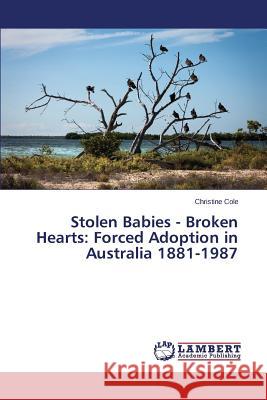Stolen Babies - Broken Hearts: Forced Adoption in Australia 1881-1987 » książka
Stolen Babies - Broken Hearts: Forced Adoption in Australia 1881-1987
ISBN-13: 9783659814549 / Angielski / Miękka / 2015 / 408 str.
This book challenges the orthodoxy that white, unmarried mothers 'chose' to give up their babies for adoption. Rather it articulates an alternate narrative detailing their systemic abuse that includes administering mind-altering drugs, illegal coercion and medical assaults perpetrated because of the demand by infertile couples for their babies. The abuses justified by a eugenic ideology that stripped these women of all rights. Since colonisation Australia's child welfare policy has been an instrument of social control and cruelty. Children and their mothers have been victims of brutal removalist policies and a phenomenon recently labelled Forced Adoption. The discourses, social policies and legislation that provided the social space for these egregious acts to occur are traced back to their roots in Imperial Britain. In addition the book incorporates research that contrasts the lived experiences of two cohorts of unwed mothers. One of which had their newborns forcibly taken whilst the other went on to keep and rear their infants. The comparison enables the dynamics that determined the differential outcomes to be identified and discussed.
This book challenges the orthodoxy that white, unmarried mothers chose to give up their babies for adoption. Rather it articulates an alternate narrative detailing their systemic abuse that includes administering mind-altering drugs, illegal coercion and medical assaults perpetrated because of the demand by infertile couples for their babies. The abuses justified by a eugenic ideology that stripped these women of all rights. Since colonisation Australias child welfare policy has been an instrument of social control and cruelty. Children and their mothers have been victims of brutal removalist policies and a phenomenon recently labelled Forced Adoption. The discourses, social policies and legislation that provided the social space for these egregious acts to occur are traced back to their roots in Imperial Britain. In addition the book incorporates research that contrasts the lived experiences of two cohorts of unwed mothers. One of which had their newborns forcibly taken whilst the other went on to keep and rear their infants. The comparison enables the dynamics that determined the differential outcomes to be identified and discussed.











